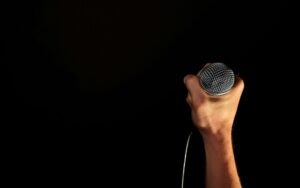The Yellow Umbrella
It was raining, the kind of soft, stubborn drizzle that smudged the world into watercolor. She was crouched by the side of the road, holding a bright yellow umbrella over a dog that wasn’t hers. It was shivering, soaked, one paw lifted like it had given up trying.
People passed. Some noticed. None stopped.
He almost didn’t either. His phone buzzed—twice, then again. A message. A meeting. Something urgent that felt less important than usual. Still, he kept walking until something about her posture—so ordinary, so reverent—made him pause.
She didn’t look at him. Not once. Just kept whispering something to the dog, brushing wet leaves off its fur with her bare hands.
He stood there, unsure if he was meant to help or simply witness.
And then she smiled. Not at him. Not really at anyone. Just… outward.
As if the whole act had been a kind of prayer.
He opened his mouth to say something. He didn’t remember what.
But at that exact moment—
the dog lifted its head.
She looked up.
And he suddenly understood something he couldn’t yet explain.
The Shape of an Unnamed Hunger
You have probably felt it on evenings that should have been perfect—after the salary landed, after the reel went viral, after the new café latte art spelled your name correctly. Everything registers as “fine,” yet somewhere behind the rib cage a hollow space stays unfilled. We label the sensation as restlessness or burnout or the wrong career path, then scroll for another solution that promises ease. But what if the emptiness is not exhaustion at all? What if it is the simple ache of being underused by the world that needs you?
A Thinner Definition of Living
Over the last decade we have mastered the craft of self-caring, self-branding, self-optimising. We are experts at auditing our boundaries, editing our schedules, curating our aspirations. The self has never been so scheduled and polished. Yet, paradoxically, our generation narrates record levels of loneliness and meaninglessness. The contradiction makes sense when we remember that the human spirit evolved in villages, not in personal highlight reels. Deep down we do not thrive in the echo chamber of our own satisfaction; we thrive when our lives bend toward something or someone beyond the perimeter of “me.”
Service Is Not a Sacrifice but a Circuit
Many of us resist the word “service” because it has been dressed in the old robes of duty, guilt, or martyrdom. In truth, service is less a sacrifice than a circuit: energy flows out of you, touches another life, and then returns as a current of belonging that no amount of applause can replicate. It does not deplete; it completes. We remember this instinctively in the rare moments we forget ourselves—a stranger’s suitcase hoisted onto a station platform, a late-night phone call answered simply because a friend asked. For a heartbeat the ego pauses, and we feel startlingly alive.
The Illusion of Constant Comfort
Comfort is sweet, but it is not nourishing. A garden sheltered from every gust of wind grows pale and fragile; so does a life protected from every tug of responsibility. We do not need perpetual struggle, yet we do need friction—something that asks more of us than the algorithmic loop of preference. Service supplies that healthy resistance. It invites us to expand, to remember muscles of compassion we had forgotten existed. And each time we choose inconvenience for the sake of someone else’s ease, the roots of our own purpose press a little deeper into the ground.
From Spectators to Participants
We live in an age that lets us witness calamity and triumph in real time. The feed spins, and we are flooded with information that rarely becomes incarnation. Eyes see, fingers tap, but bodies stay seated. Participation, however, is an antidote to helplessness. When you place yourself inside a story—mentoring a local student, helping a neighbour contest an unfair bill, giving Saturday mornings to clean a riverbank—the headlines shrink to human scale. Problems stop feeling abstract; victories taste personal. Suddenly the world is not something happening to you but something changing through you, and meaning rises like blood returning to a limb that had fallen asleep.
What Service Could Look Like Now
Service does not always require grand gestures or spare cash. It might look like offering your digital skills to a community project that still keeps its records on paper, or sharing your ability to listen without interruption when a friend’s voice cracks. It might be choosing to bike across the city to donate blood after work, or quietly paying for the meal of the delivery rider who already skipped his own dinner. None of these acts will trend, and that is precisely why they restore a sense of substance in a world saturated with signals.
The Alchemy of Being Needed
Psychologists speak of “self-transcendent emotions”—awe, compassion, elevation—that broaden our mental horizons and knit us closer to others. We often chase those feelings through travel or art, but they frequently arrive unannounced in the middle of service. You hand a coat to a shivering stranger, and for a second the boundaries between lives blur; you glimpse something spacious, tender, and entirely worth waking up for. Being needed is not a burden; it is an alchemy that turns ordinary time into sacred ground.
Answering the Quiet Invitation
If you sense that unnamed hunger tonight, resist the reflex to medicate it with more comfort. Instead, listen. Somewhere nearby there is a gap shaped uncannily like your particular kindness, patience, expertise, or spare hour. Step into that gap. Start small if you must, start imperfectly, but start. Because the vacancy in your own life may well be the vacancy in someone else’s life awaiting your arrival, and fulfillment is often just a handshake between those two empty spaces.
Whole
Imagine waking tomorrow with the conviction that the day is not a canvas for personal branding but a field for quiet contribution. Imagine lying down tomorrow night with the tired happiness of someone whose strength was spent, not stored. The hollow behind your ribs would not be gone; it would be full—warm, humming, alive—with the weight of having mattered.
May you meet that fullness often. May you offer it freely. And may the world, stitched together by such invisible threads of service, become a place where no one mistakes numbness for peace again.




